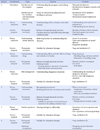Abstract
Purpose
The aim of the present study was to examine the effects of a stress relief program on burden, anxiety, depression and stress response in family members of patients with mental illness.
Methods
A quasi-experimental study using a non-equivalent comparison group pretest and posttest design was used. Participants were family members of patients with mental illness at a mental health center in C city (15 in the experimental group and 17 in the comparison group). The program was provided for 90-100 minutes/session once a week, for 8 weeks. Data were analyzed using descriptive statistics, χ2-test and Mann-Whitney U-test.
Figures and Tables
References
1. Austin DR, Crawford ME. Therapeutic recreation: An introduction. 1991. New Jersey: Prentice-Hall, Inc.
2. Chae JA. A study of development of recreation program based on the therapeutic recreation service model. Soc Welf Rev. 1997. 2(1):133–169.
3. Cho YR, No HJ, Choi YJ, Yang SS, Ji EH. The effects of a stress management program on depression, stress responses, perceived health status, and emotion dysregulation in community-dwelling older adults: A preliminary study. Cognitive Behav Ther Korea. 2008. 8:27–50.
4. Choi JY, Suh KH. The effects of yoga practice on stress responses. Korean J Health Psychol. 2005. 10:455–473.
5. Jung SK. A study on the effectiveness of family functioning by the duration of schizophrenia. J Korean Fam Ther. 1993. 1:121–136.
6. Kang SK. The impacts of the attitudes, stress coping, and social supports of parents with handicapped children upon the life satisfaction of the parents. Ment Health Soc Work. 2002. 14:7–35.
7. Kim CK, Cho JS, Seo JS, Kim YK, Kim HC, Kim SS, et al. A preliminary study for the development of the family burden scale of the schizophrenia. J Korean Neuropsychiatr Assoc. 1999. 38:539–553.
8. Kim DY, Kim DJ, Na WH. The effects of therapeutic recreation on emotional behavior of adolescents with intellectual disability. J Rehabil Res. 2008. 12:195–211.
9. Kim GH, Kim HJ. Original articles: The effect of therapeutic recreation program on the depression and self-esteem in nursing students. J Korean Acad Psychiatr Ment Health Nurs. 2006. 15:500–507.
10. Kim JT, Shin DK. A study based on the standardization of the STAI for Korea. New Med J. 1978. 21:69–75.
11. Kim MJ, Jung SL. The effect of family education program on the knowledge and the burden of schizophrenia patient's family. J Korean Acad Psychiatr Ment Health Nurs. 2002. 11:273–284.
12. Kim SS, Lee JS. Effects of therapeutic recreation programs on psychiatric patients' depression and human relationship. Chonnam J Nurs Sci. 1996. 1:1–21.
13. Kim YS. A study on positive caregiving appraisal and positive affect of parent caregivers of a person with mental disorder. Ment Health Soc Work. 2006. 22:91–124.
14. Ko KB, Park JK, Kim CH. Development of the stress response inventory. J Korean Neuropsychiatr Assoc. 2000. 39:707–719.
15. Lee JH. Development of the Korean form of Zung's Self-rating Depression Scale. Yeungnam Univ J Med. 1995. 12:292–305.

16. Lee SG. Burden and service needs of families with the mentally handicapped. 2003. Busan: Inje University;Unpublished master's thesis.
17. Lee YH, Sim JC, Lee SK, Sim YS, Kim YG, Kim KS, et al. Effect of a psychoeducational family therapy model for the families of schizophrenic patients. J Korean Neuropsychiatr Assoc. 2000. 39:479–494.
18. Lee YS. A suggested guideline for a family education program for the rehabilitation of the discharged schizophrenics. Ment Health Soc Work. 1997. 4:81–100.
19. Mafullul YM. Burden of informal carers of mentally infirm elderly in Lancashire. East Afr Med J. 2002. 79(6):291–298.
20. Ministry of Health and Welfare. The 2011 epidemiological survey of mental disorders in Korea. 2011. Seoul: Author.
21. Park GS, Lee YH, Sim KS. The effects of family education to reduce the anxiety and stress of schizophrenia patient's family. Ment Health Soc Work. 1998. 5:101–122.
22. Peterson CA, Gunn SL. Therapeutic recreation program design: Principles and procedures. 1984. 2nd ed. Englewood Cliffs, New Jersey: Prentice Hall, Inc.
23. Seol JH. The effectiveness of brief family education programs for schizophrenic outpatients and their families in a community social welfare center. Korean J Soc Welf. 2004. 56(2):261–283.
24. Son MJ. Development of family education program for persons with schizophrenia. Korean J Clin Psychol. 1994. 13:169–185.
25. Son MJ, Bae JK, Bae HS, Lee EJ. To manage their own stress. 1999. Daegu: Rehabilitation Institute of Mental Saemirae.
26. Spielberger CD, Gorsuch RL, Lushene RE. Manual for the state-trait anxiety inventory. 1970. Palo Alto, CA: Consulting Psychologist Press.
27. Um MS. The family environment where one member of the family is receiving psychiatric care. J Korean Acad Psychiatr Ment Health Nurs. 1992. 1:17–38.
28. Yang KH. The application of a therapeutic recreation program to decrease problem behaviors of children with ADHD. J Leis Recreation Stud. 2010. 34(3):195–205.
29. Yongin Mental Hospital WHO Collaborating Center. Family link. 2010. Seoul: Author;from http://dws026.dongwonweb.co.kr/filedown2/mental_edu02_guide.pdf.
30. Yu SY, Yun DH. The effect of the therapeutic recreation as yoga on self-esteem, interpersonal relationship and social skills of persons with chronic mental disorder. J Sport Leis Stud. 2009. 38:1033–1047.

31. Zipple AM, Spaniol LJ. Hatifield AB, Lefly HP, editors. Current education and supportive models of family intervention. Families of the Mentally Ill: Coping and Adaptation. 1987. New York: Guilford Press.




 PDF
PDF ePub
ePub Citation
Citation Print
Print








 XML Download
XML Download